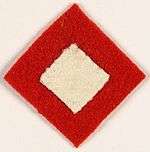42nd Armoured Division (United Kingdom)
| 42nd Armoured Division | |
|---|---|
 42nd Division insignia | |
| Active | 1 November 1941 – 17 October 1943 |
| Country |
|
| Branch |
|
| Type | Armoured Division |
| Size |
13,235 men[1] 227 tanks[nb 1][nb 2] |
The 42nd Armoured Division was an armoured division of the British Army raised during the Second World War. It was formed by converting an infantry division into an armoured role. It was never deployed overseas and was disbanded before seeing combat.
The division was formed in late 1941 by converting the 42nd (East Lancashire) Infantry Division,[3] a 1st Line Territorial Army infantry formation that saw service in France and was evacuated at Dunkirk in 1940,[4] on 1 November 1941 into an Armoured Division.[3] However, the division was not posted overseas[5] and its divisional headquarters was disbanded on 17 October 1943;[3] the division's infantry was assigned to the 53rd (Welsh) Infantry Division and its armour to the 79th Armoured Division.[5]
General Officer Commanding
Two men served as the General Officer Commanding of the 42nd Armoured Division:
- Major-General Miles Dempsey[6]
- Major-General John Aldam Aizlewood[6]
Order of battle
10th Armoured Brigade
- 108th Regiment Royal Armoured Corps (Lancashire Fusiliers)
- 109th Regiment Royal Armoured Corps (Lancashire Fusiliers)
- 143rd Regiment Royal Armoured Corps (Lancashire Fusiliers)
- 13th Battalion, Highland Light Infantry
On 1 November 1941, the 10th Armoured Brigade was converted from the 125th Infantry Brigade, of three battalions of the Lancashire Fusiliers, and was attached to the 42nd Armoured Division. It comprised the 108 RAC (previously 1/5th Battalion), 109 RAC (1/6th Battalion) and 143 RAC (9th Battalion). On 25 July 1942, the brigade was converted again into the 10th Tank Brigade and finally disbanded on 25 November 1943. The 10th Armoured Brigade did not see active service as a unit and was broken up in late 1943.
11th Armoured Brigade
- 107th Regiment Royal Armoured Corps (King's Own)
- 110th Regiment Royal Armoured Corps (Border Regiment)
- 111th Regiment Royal Armoured Corps (Manchester Regiment)
- 1st Battalion, Highland Light Infantry
42nd Support Group
- 1st Battalion, East Lancashire Regiment
- 147th (Essex Yeomanry) Regiment, Royal Horse Artillery
- 53rd (Worcestershire and Oxfordshire Yeomanry) Anti-Tank Regiment, Royal Artillery
- 93rd Light Anti-Aircraft Regiment, Royal Artillery
In the early days of the Second World War the support group (or Pivot Group as it was sometimes known) was what its name suggested. It provided whatever support the armoured brigades needed to the operation in hand, being able to provide motorised infantry, field artillery, anti-tank artillery or light anti-aircraft artillery as needed.
Divisional troops
- 112th Regiment Royal Armoured Corps (Foresters) (armoured car regiment) (from 17 November 1941, left 24 February 1943)
- 1st Northamptonshire Yeomanry (from 18 April 1943, left 16 October 1943)
- HQ 42nd Divisional Royal Engineers
- 16th Field Company, RE
- 17th Field Company, RE (until 1 March 1943)
- 617th Field Company, RE (from 1 March 1943)
- 149th Field Park Company, RE
- 42nd Armoured Division Signal Regiment, Royal Corps of Signals
See also
Notes
- Footnotes
- ↑ 201 tanks and 26 anti-aircraft tanks.[2]
- ↑ These two figures are the war establishment, the on-paper strength, of the division; for information on how divisions size changed over the war, please see British Army during the Second World War and British Armoured formations of World War II.
- Citations
References
- Chappell, Mike (1987). British battle insignia (2): 1939-1940. Men-At-Arms. Osprey Publishing. ISBN 0-85045-739-4.
- Joslen, Lieutenant-Colonel H.F (1960) [1960]. Orders Of Battle Second World War 1939-1945. Naval & Military Press Ltd. ISBN 978-1-84342-474-1.
External links
- "42 Armoured Division". Orders of Battle.com.
- Royal Artillery Site